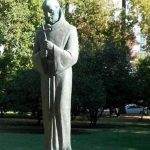Even though the Easter season has ended, some bishops are still traveling across their dioceses administering the Sacrament of Confirmation, strengthening young Catholics with the gifts of the Holy Spirit: wisdom, understanding, counsel, fortitude, knowledge, piety, and fear of the Lord. This list of seven appears in Isaiah 11:1-3, where we read:
But a shoot shall sprout from the stump of Jesse, and from his roots a bud shall blossom. The spirit of the LORD shall rest upon him: a spirit of wisdom and of understanding, a spirit of counsel and of strength, a spirit of knowledge and of fear of the LORD, and his delight shall be the fear of the LORD.
These gifts, of course, primarily refer to Jesus Christ, the subject of the Isaian prophecy, who shares them freely with the members of His mystical body, the Church.
Three of these gifts sound so similar that they can be difficult to distinguish: wisdom, understanding, and knowledge. What could possibly be the difference between these virtual synonyms? If we manage to tease out any difference between them, we may be more attuned to the workings of the Spirit and aware of how these gifts can guide our moral and spiritual lives.
We must first acknowledge, however, that, in keeping with the linguistic richness of Old Testament Hebrew, any distinction between them may not be as neat and clean as we would like. Yet there is indeed a theological tradition of distinguishing them, and we can get an idea of how to do so with the help of St. Thomas Aquinas.
Aquinas lays the foundation for wisdom by noting that Aristotle defined it as the virtue by which we consider the “highest cause.” The wise man possesses knowledge not simply with regard to a certain area, such as architecture or law, but with respect to God Himself. Such a person “is able to judge and set in order all things according to divine rules” (Summa Theologiae II-II, 45, 1).
A distinctive feature of wisdom is that it allows us to judge connaturally. In other words, through habit—and not just through speculative knowledge—we can judge according to God’s standard and perfect our virtue by acting virtuously. The Latin word for wisdom—sapientia—brings this feature out, in that it is rooted in the word “sapere,” which means “to taste.” Through the gift of wisdom, we can “taste” what is good and just instead of knowing it in an abstract way, and, like when tasting a fine wine, we can relish in the pleasure we derive from performing an action according to wisdom. Wisdom, for example, excites us about going to Mass on Sunday rather than doing it out of fear of falling into mortal sin.
What about “understanding” (intellectus)? Understanding is an intimate kind of knowledge. It literally means “to read within” (intus legere). Drawing on Aristotle (cf. De Anima III), Thomas teaches that, unlike sense knowledge, understanding—or “intellective cognition”—penetrates to the core essence of a thing. In the case of the Holy Spirit’s gift of understanding, the “thing” in question is not just anything, but a divine thing, such as God Himself, His grace, or the heroic virtue of the saints. When we understand one of these, we know exactly what it is.
Beneath the accidental features lies the substantial nature, beneath a word lies the things it signifies, and beneath similitudes and figures lies the truth that is figured (cf. Summa Theologiae II-II, 45, 1). The true intelligibility of things is, in a certain sense, interior to their sensible qualities.
Another way of expressing this is to say that, through the gift of understanding, we understand the essential connection between a cause and its effect. If I attend Mass on Sunday, I can, through understanding, see the effect it has on my soul and my actions throughout the week, and if I notice any blessings during the week, I can see how they are directly related to their cause, i.e., the Sunday Eucharist.
“Knowledge” (scientia) is also distinctive among these gifts of the Spirit. Although it is not a “practical” virtue—i.e., it doesn’t consist primarily in a knowledge of what to do—it does impart the ability to cling to “first truth” so that we are better oriented toward knowing what we are to do. “First truth” is, of course, God, who is also the ultimate end for which we act, thus ordering our entire life of action. The gift of knowledge principally empowers us to see what we are to hold by faith. Secondarily, it extends to our actions insofar as, through a knowledge of what we believe, we are led to do what is right.
Aquinas’s analysis of the gift of knowledge has vast implications for our life of prayer and discernment. When we beg the Holy Spirit for the gift of knowledge, we are begging to see God more clearly by means of the things we believe about Him through faith. Similarly, Aquinas also says that knowledge pertains properly to the ability to judge created things rightly (cf. ST II-II, 9, 4).
Thus, the Spirit’s gift of knowledge leads us to a greater certainty that God is the source of all good and is Himself the final good. When we hear God’s Word at Sunday Mass, the gift of knowledge helps us to put created things in order throughout the week and direct them to their definitive end, God.
The gift of knowledge helps me answer such questions as: Am I working only for the money? Am I taking the time to help my children grow in the Catholic Faith? Am I finding ways to spend more time in prayer and more time with my family? Am I cultivating relationships with moral, upright friends who will help me grow closer to the Lord? In short, how does each action I perform and each decision I make lead to my final end, God?
The ancient hymn Veni Creator Spiritus offers us a splendid image of the Holy Spirit as the “finger of the right hand of God” who imparts the sevenfold gift to us. The Holy Spirit “enriches throats with speech” (sermone ditans guttura), meaning that the gifts of wisdom, understanding, and knowledge will have a direct effect on what we say, to whom we say it, and when. Words are neither neutral or inane; they either mirror or mar the Word within us.
Let us continue to pray for young confirmands so that they may open their hearts and allow the finger of God do its magnificent work.
Editor’s Note: For more from this author on the Gifts of the Holy Spirit, read “Knowledge is a Gift of the Holy Spirit—but Knowledge of What” by clicking here.
Photo by Davide Cantelli on Unsplash


















